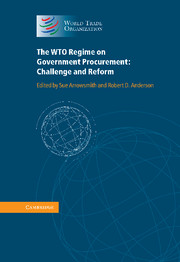Book contents
- Frontmatter
- Contents
- List of contributors
- Foreword by Pascal Lamy
- Perspective of the Chairman of the WTO Committee on Government Procurement, Nicholas Niggli (Switzerland)
- Preface
- Disclaimer
- PART I The WTO regime on government procurement
- PART II Expanding the scope of the Agreement on Government Procurement: accession and coverage
- PART III Revision of the procedural rules and other transparency provisions of the Agreement on Government Procurement
- PART IV Developing countries in the WTO procurement regime
- PART V Economic and social development (horizontal policies) in government procurement
- 14 The national treatment and exceptions provisions of the Agreement on Government Procurement and the pursuit of horizontal policies
- 15 The limited case for permitting SME procurement preferences in the Agreement on Government Procurement
- 16 Social policies in procurement and the Agreement on Government Procurement: a perspective from South Africa
- PART VI Enforcement and remedies
- PART VII Multilateralism and regionalism
- PART VIII Challenges and new directions
- Index
15 - The limited case for permitting SME procurement preferences in the Agreement on Government Procurement
from PART V - Economic and social development (horizontal policies) in government procurement
Published online by Cambridge University Press: 07 September 2011
- Frontmatter
- Contents
- List of contributors
- Foreword by Pascal Lamy
- Perspective of the Chairman of the WTO Committee on Government Procurement, Nicholas Niggli (Switzerland)
- Preface
- Disclaimer
- PART I The WTO regime on government procurement
- PART II Expanding the scope of the Agreement on Government Procurement: accession and coverage
- PART III Revision of the procedural rules and other transparency provisions of the Agreement on Government Procurement
- PART IV Developing countries in the WTO procurement regime
- PART V Economic and social development (horizontal policies) in government procurement
- 14 The national treatment and exceptions provisions of the Agreement on Government Procurement and the pursuit of horizontal policies
- 15 The limited case for permitting SME procurement preferences in the Agreement on Government Procurement
- 16 Social policies in procurement and the Agreement on Government Procurement: a perspective from South Africa
- PART VI Enforcement and remedies
- PART VII Multilateralism and regionalism
- PART VIII Challenges and new directions
- Index
Summary
Introduction
Governments of countries with diverse levels of wealth maintain preferential procurement policies to support small and medium-sized enterprises (SMEs). The US is one of the most remarkable examples. With billions of dollars annually set aside for contract awards made exclusively to what in the US are known as small business concerns, the US maintains some of the most extensive SME procurement preference policies that can be found anywhere in the world. So much for all the rhetoric on President Obama as socialist; these programmes have been in existence since 1953. Irony is the notion that comes to mind when trying to understand the US approach, as the US also is able to liberalize substantial dollar values of its procurements as a contracting party to the World Trade Organization (WTO) Agreement on Government Procurement (GPA) and in unilateral and regional trade agreements. Other countries maintain preferential SME policies. South Africa maintains an evaluation preference system to award points to firms contributing to what is known as broad-based black empowerment in South Africa. Notably, South Africa's programme is nowhere near as broad as the programmes found in the US. Some US programmes benefit firms owned by individuals who belong to historically disadvantaged groups in the US, but the US programmes also benefit ordinary SMEs, regardless of ownership. Malaysia maintains a substantial preference programme to award government contracts to people of Malay descent, the Bumiputera, who are the majority population in the country, to counter the market-dominant Chinese minority in that country.
- Type
- Chapter
- Information
- The WTO Regime on Government ProcurementChallenge and Reform, pp. 444 - 458Publisher: Cambridge University PressPrint publication year: 2011
- 2
- Cited by



